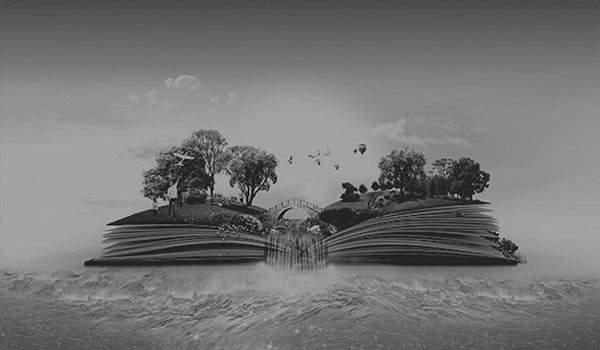
Hello, water wanderers and lovers of the liquid world! If you’re drawn to the soothing sounds of a babbling brook, the vast expanse of the ocean, or the simple beauty of raindrops on a window, then you’ve found your haven.
The topic of water cuts across multiple disciplines, including science, history, culture, politics, and economics. Books about water provide valuable information and insights into water’s importance, characteristics, and various aspects. They expand your understanding of water as a vital resource, its role in ecosystems, its impact on climate, and its significance for human life and civilization.
The authors discuss environmental issues related to water scarcity, pollution, climate change, and habitat destruction throughout the books. Reading about these topics raises awareness of our planet’s challenges and inspires us to take action to protect and conserve water resources.
So, we’re diving deep into the essence of life itself—water—through the pages of literature. From scientific explorations and environmental studies to philosophical musings and epic tales of adventure on the high seas, we’ve curated a collection of books that celebrate, examine, and reflect upon the role of water in our world and our lives. Whether you’re a sailor at heart, a conservationist, or simply someone who finds peace in the rain, let’s go on a journey through the currents of knowledge and narrative, where every drop of water holds a story waiting to be told.
7 Books About Water (Environmental Science)
Water is associated with relaxation, tranquility, and a sense of calm. It is an essential part of our daily lives, and reading about it can help you forge a personal connection to this vital resource. Understanding water’s significance can foster a sense of gratitude, mindfulness, and responsibility for how we use and interact with water in our daily activities.
I’ll talk about 7 important books about water. They shed light on water scarcity, lack of access to clean water, and these issues’ social and economic implications. Reading about diverse experiences can cultivate empathy, broaden your perspective, and inspire a commitment to global water justice. Many offer solutions, innovations, and examples of individuals and communities making a positive difference. Let’s begin!
| Name | Average Ratings (Goodreads) | Pages |
|---|---|---|
| The Big Thirst by Charles Fishman | 3.9/5 | 418 |
| Cadillac Desert by Marc Reisner | 4.2/5 | 582 |
| Blue Mind by Wallace J. Nichols | 3.7/5 | 352 |
| The Ripple Effect by Alex Prud’homme | 3.9/5 | 447 |
| Water by Steven Solomon | 3.8/5 | 608 |
| The Water Will Come by Jeff Goodell | 4.1/5 | 352 |
| Waterlog by Roger Deakin | 4.2/5 | 340 |
1. The Big Thirst: The Secret Life and Turbulent Future of Water by Charles Fishman
The Big Thirst is an enlightening book that shows water’s complex and vital world. Fishman explores the various aspects of water, ranging from its history, global usage, and future challenges to its critical role in our daily lives. Through extensive research, he takes us on a journey to understand the significance of water in different contexts. He reveals the hidden stories and surprising facts about water, such as its role in the Industrial Revolution, its impact on economic development, and the intricate systems that bring water to our homes.
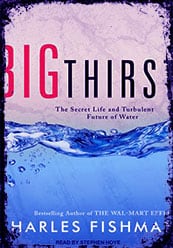
The book offers a glimpse into the future of water, discussing the challenges that arise from population growth, climate change, and competing demands for this finite resource. Fishman talks about water scarcity, water management, and the environmental impact of our water consumption, providing readers with a deeper understanding of these pressing issues.
Also, he explores innovative solutions to address these challenges and promote sustainable water practices. Overall, the book serves as an eye-opening exploration of the intricate world of water, providing a deeper appreciation for this vital resource and the urgent need for responsible water stewardship.
2. Cadillac Desert: The American West and Its Disappearing Water by Marc Reisner
Cadillac Desert is a seminal work that exposes the history, politics, and environmental challenges surrounding water management in the American West. Through meticulous research and captivating storytelling, Reisner paints a vivid picture of the complex relationship between water, power, and human intervention in arid regions.
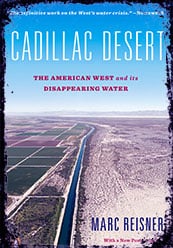
The book shows the history of water development in the West, tracing the origins of grand engineering projects, such as dams and irrigation systems. That transformed the landscape and made agriculture and urbanization possible in regions that would otherwise be inhospitable. Reisner explores the ambitious visions and political maneuverings behind these projects, revealing the contentious battles for control over water resources.
He also examines the ecological impact of water diversion and the consequences of unsustainable water practices. The book highlights the tension between meeting human demands for water and preserving the natural balance of the environment. The author illustrates how the thirst for water has resulted in the desiccation of rivers, the depletion of aquifers, and the degradation of once-thriving ecosystems. It sheds light on the water rights controversies, water scarcity issues, and stakeholder conflicts that continue shaping the American West.
3. Blue Mind by Wallace J. Nichols
Blue Mind is a thought-provoking book that explores the psychological and physiological benefits of being in or near water. Nichols combines scientific research, personal anecdotes, and interviews to shed light on the positive effects that water can have on our well-being. He focuses on the neurological, psychological, and emotional aspects of this phenomenon, presenting compelling evidence that being in the presence of water can reduce stress, boost creativity, and enhance overall mental and physical health.
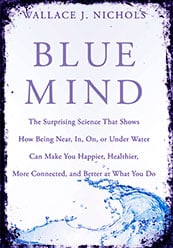
The book explores the impact of water on brain chemistry, cognitive functioning, and emotional well-being, providing us with a comprehensive understanding of how our connection with water can positively influence our lives. Nichols draws upon various scientific disciplines, including neuroscience, psychology, and environmental science, to support his claims. He also emphasizes the reciprocal relationship between our well-being and the health of our oceans, lakes, and rivers. While reading the book, I understood that water is life and nothing can replace it.
4. The Ripple Effect: The Fate of Freshwater in the Twenty-First Century by Alex Prud’homme
The Ripple Effect is a historical nonfiction book that explores the current state of freshwater resources and the challenges we face in managing and preserving them in the 21st century. Alex examines the global water crisis, discussing its causes, implications, and potential solutions. He describes the complex issues surrounding freshwater, including water scarcity, pollution, over-extraction, and the growing demand for this essential resource. Also, he explores case studies from around the world, highlighting the social, economic, and environmental impacts of water mismanagement and the consequences for communities, ecosystems, and future generations.
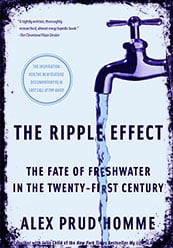
The book draws from interviews with experts, policymakers, and individuals directly affected by water issues, offering diverse perspectives and real-life stories that bring the subject to life. The author discovers successful conservation efforts, technological advancements, and policy initiatives that provide hope and inspire positive change.
He also emphasizes the importance of individual and collective action in addressing water challenges and creating a more sustainable future. This book was published in 2011, so some data and specific examples may have evolved since then. However, the overarching themes and challenges discussed in the book remain relevant today.
5. Water: The Epic Struggle for Wealth, Power, and Civilization by Steven Solomon
Water is an environmental science book exploring water’s historical, economic, and geopolitical significance throughout human civilization. Solomon shows the complex relationship between water and human societies, tracing its impact on the rise and fall of civilizations and its influence on global power dynamics. He takes us on a journey through time, examining how water scarcity and abundance have shaped human history. Throughout the journey, he explores the role of water in agriculture, industry, and human settlement, shedding light on its transformative effects on economies and cultures worldwide.

This book highlights the challenges of managing water resources, from ancient irrigation systems to modern dam projects. The author focuses on the engineering feats and political struggles in controlling water for agricultural, industrial, and domestic purposes, offering insights into the evolving methods and technologies used to harness and distribute water. Readers will realize the need for sustainable practices and international cooperation to address water scarcity and ensure the availability of clean water for future generations.
6. The Water Will Come: Rising Seas, Sinking Cities, and the Remaking of the Civilized World by Jeff Goodell
The Water Will Come is a sobering exploration of the impact of climate change-induced sea-level rise on coastal cities and communities worldwide. Goodell combines scientific research, expert interviews, and on-the-ground reporting to illuminate the imminent threat of rising sea levels.
He examines the causes and consequences of sea-level rise, explaining the role of global warming and its effect on the melting of polar ice caps and glaciers. He presents a vivid picture of the potential future scenarios, discussing the risks faced by low-lying coastal regions, the challenges of adapting to rising sea levels, and the potential for massive population displacement.
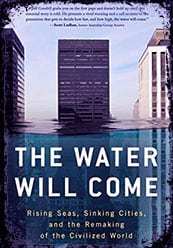
This book provides firsthand stories of sea-level rise’s existing and anticipated impacts. Jeff discusses the economic, social, and environmental ramifications, including flooding, saltwater intrusion, infrastructure damage, and the potential loss of cultural heritage.
Also, he highlights the influence of powerful vested interests, the challenges of long-term planning, and the need for international cooperation to address this global crisis. So, the book serves as a wake-up call, urging individuals, policymakers, and communities to recognize the urgent need for action on climate change and rising sea levels.
7. Waterlog: A Swimmer’s Journey Through Britain by Roger Deakin
Waterlog is an introspective memoir that takes readers on a unique adventure through the waterways of Britain. Deakin, an avid swimmer and nature writer, goes on a quest to explore Britain’s rivers, lakes, and seas, immersing himself in the natural beauty and cultural history of these aquatic environments. He shares his meetings with various water bodies, from hidden pools and remote rivers to iconic coastal locations. His prose beautifully captures the sensations of swimming in the open water, evoking a deep sense of connection with nature.
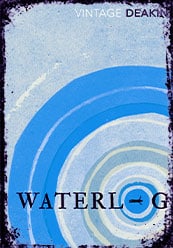
Beyond the physical act of swimming, Deakin explores the historical, cultural, and ecological significance of the places he visits. The book represents the folklore, literature, and art associated with water, providing readers with a rich tapestry of narratives that enhance the sense of place and deepen the appreciation for these watery landscapes.
Throughout the book, Deakin reflects on the transformative power of water and the meditative qualities of swimming. His introspective musings invite us to contemplate their relationship with water and the natural world.
Preschool books about water
Books about water for preschoolers can spark curiosity and foster a sense of wonder about the natural world and the importance of water conservation and stewardship. Here are some preschool books that introduce young children to the concept of water in an engaging and age-appropriate way:
All the Water in the World by George Ella Lyon and Katherine Tillotson: This beautifully illustrated book explores the various forms of water, from oceans and lakes to clouds and rain. It highlights the importance of water in our lives and encourages children to appreciate and care for this precious resource.
Water is Water: A Book About the Water Cycle by Miranda Paul and Jason Chin follows a group of children. They experience the different states of water throughout the seasons. It introduces the water cycle simply and playfully, emphasizing how water changes form but remains constantly in our lives.
In this interactive picture book, splash! by Flora McDonnell: Children join a little girl on a rainy adventure. The book uses colorful illustrations and onomatopoeic language to capture the joy of playing in the rain and experiencing water in various forms.
Who Sank the Boat? by Pamela Allen: This classic book follows the humorous misadventures of a group of animals. They try to fit into a small boat. Through playful rhymes and delightful illustrations, the book introduces concepts of buoyancy and water displacement.
I Am Water by Jean Marzollo: This simple board book uses vibrant photographs and repetitive text to introduce young children to water’s many forms and uses. It highlights water’s role in daily activities such as drinking, bathing, and playing.
The Water Princess by Susan Verde and Peter H. Reynolds: Based on the childhood experiences of model Georgie Badiel, this book tells the story of a young girl who must travel long distances to fetch clean water for her village. It raises awareness about the importance of clean water access and encourages empathy and gratitude.
These books offer engaging narratives, beautiful illustrations, and age-appropriate language to introduce preschoolers to the concept of water, its different forms, and its significance in our lives.
Children’s books about water
Here are some children’s books about water that are engaging and educational:
A Cool Drink of Water by Barbara Kerley: This book explores the importance of water in our daily lives, showing children the various ways water is used worldwide, from drinking and bathing to farming and transportation.
Whoosh! Lonnie Johnson’s Super-Soaking Stream of Inventions by Chris Barton: This biography tells the inspiring true story of Lonnie Johnson, the inventor of the Super Soaker water gun, and highlights the power of creativity and innovation.
One Well: The Story of Water on Earth by Rochelle Strauss: This informative book takes children on a journey to discover the interconnectedness of water on Earth, exploring its distribution, importance for ecosystems, and the need for conservation.
All the Way to the Ocean by Joel Harper: This book follows two friends, Isaac and James. They learn about the connection between their actions and the ocean’s health. It teaches children about the importance of reducing pollution and protecting our waterways.
The Magic School Bus at the Waterworks by Joanna Cole and Bruce Degen: Join Ms. Frizzle and her students on a magical field trip through the waterworks system, exploring the water cycle, water treatment, and the importance of conservation.
Over and Under the Pond by Kate Messner: In this beautifully illustrated book, a mother and child explore the world above and beneath a pond, discovering the diverse plants and animals that rely on water for survival.
Rain! by Linda Ashman: This cheerful rhyming book celebrates the joy of rainfall, showing how rain brings life to plants, animals, and people while also highlighting the importance of rain for our planet.
We hope this journey has quenched your thirst for knowledge and deepened your appreciation for this vital and beautiful element that dances through our lives in countless forms. Each book we’ve traversed together is a tributary leading to the vast ocean of understanding about water’s power, beauty, and necessity. As you move forward, may the flow of insights and stories you’ve encountered inspire you to see the water around you with new eyes—whether it’s a drop of dew, a river carving through the landscape, or the endless sea under the moonlight.
Until our paths converge again on another voyage of discovery, keep the rivers of curiosity flowing, and may your explorations through the pages of the world always lead you to refreshing and enlightening shores. Happy reading, and may the waters of wisdom always run deep in your journey through life.
Read more similar:
Nature Science Books Like Braiding Sweetgrass
Adventure Books About Savannah GA
Table of Contents

